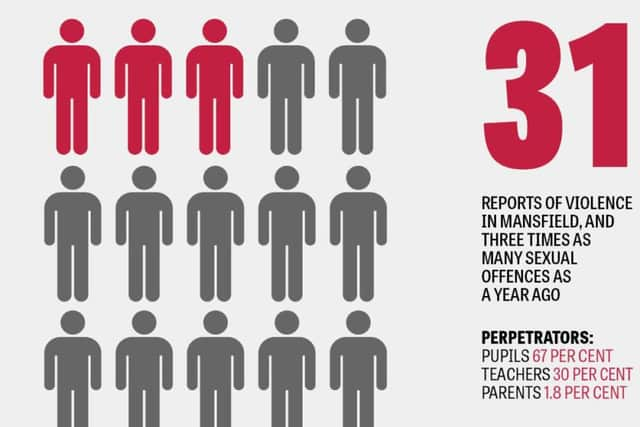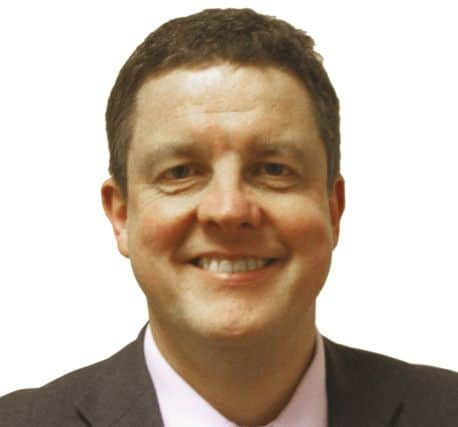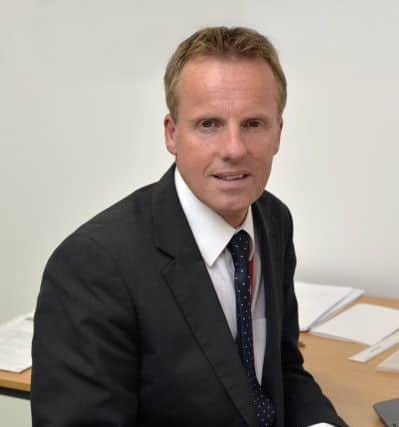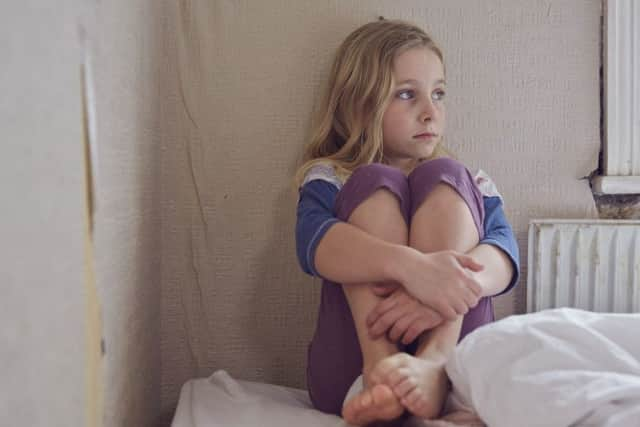SPECIAL REPORT: Hidden crime in our schools


Playgrounds and classrooms are supposed to be a “sanctuary” for our children and young people, with their safety guaranteed no matter what’s going on outside.
But a new investigation by the Chad reveals how sexual exploitation and other offences have become more common in our schools – second only to incidents of violence.
Advertisement
Hide AdAdvertisement
Hide AdCases range from teenagers experiencing pressure and unwanted sexual advances in a relationship context, to teachers reporting young children for harmful sexual behaviour – and the NSPCC says that while action is needed, there must be a proportionate safeguarding response.


The figures coincide with regional research by children’s charity Plan International, who show a marked rise in sexual offences at our schools.
In Nottinghamshire, offences have risen over the past four years, from only five across the county to 43 reports in 2014-15.
Nationally, 10 per cent of these are likely to be rape, with 30 per cent of crimes perpetrated by teachers.
Advertisement
Hide AdAdvertisement
Hide AdBut the research found sex crimes in schools are now far more likely to be perpetrated by children.


Of the 1,166 reports where the suspect was known, 788 were pupils – 67 per cent. The findings led the charity to call on the Government to commit to new mandatory sex and relationship education to cover sexting, consent, healthy relationships and the law. Kerry Smith, head of girls’ rights at Plan International, says: “This shows we’re failing young people when it comes to learning about healthy relationships and consent.
“Quality sex and relationships education helps young people develop healthy attitudes towards sex and relationships, while helping tackle inappropriate and aggressive sexual behaviour.”
An NSPCC spokesman describes the marked rise, both nationally and regionally, as “deeply concerning”.
Advertisement
Hide AdAdvertisement
Hide AdHe says: Over the last few years, thousands of young people have made allegations of sexual offences committed against them in school; a place that should be a sanctuary for children where they are safe from such horrors.


“The rise in reporting to police reflects a worrying trend which should make all authorities and parents sit up and take notice.”
However, the new challenge teachers and parents face is that the new crimes follow new technologies – and while our children have become more independent with access to smartphones and the internet they may also face new risks that go under the radar.
Seventeen-year-old James was a victim of “revenge porn”, where nude images shared in a relationship end up in the public domain.
Advertisement
Hide AdAdvertisement
Hide AdHe says: “My friends and I talk openly about sexting, our experiences within our relationships, and the sort of things we’ve sent each other, so it can seem like everyone’s doing it.


“There are definitely risks involved.
“Someone saw a video message I had sent to a previous girlfriend, took a screen shot and posted it online.
“They called me a pervert and lots of people I knew saw it – it was clearly me pictured.
“I was completely devastated and, to be honest, almost suicidal.
Advertisement
Hide AdAdvertisement
Hide Ad“I got the picture taken down eventually, but by that stage people had ‘unfriended’ me and the damage was done.”
James was supported by the NSPCC – and the charity says many parents get in touch with advisors, worrying their children are involved in sexting.


One mum, who cannot be named to protect her child, said: “I’ve just found out my daughter has been sent some nude selfies on this instant messaging app.
“She had been speaking to these people and they started sending her inappropriate images and asked her to send them things.”
Advertisement
Hide AdAdvertisement
Hide AdUnderage sexting is growing, with some 1,400 children being counselled after a harmful experience last year, while only half of all parents are even aware minors sending nude selfies is illegal.
Peter Wanless, NSPCC chief executive, says: “Sharing nude selfies can put young people at risk of bullying by peers or being targeted by adult sex offenders, so it’s vital parents talk to their children and young people feel empowered to say no to sexting requests.
“We realise talking about sexting can be an embarrassing or awkward conversation for both parents and children.
“And although most parents said they would seek help if an indecent image of their child had been shared on the internet, half of them weren’t confident about getting the right support.”
Advertisement
Hide AdAdvertisement
Hide AdSex crimes more common than bike thefts, our investigation finds
There were 78 reports of crime at schools in the Mansfield area last year, and the trends show the most common reports are of violence and sexual assault.
For the financial year 2015-16, there were 21 reports of violence involving injury and another 11 without injury, while people at schools also made 15 reports of sexual offences.
The figures, revealed in a Freedom of Information response by Nottinghamshire Police, compare with low numbers of other crimes.
Advertisement
Hide AdAdvertisement
Hide AdFor the year, there were only four burglaries, four incidents of criminal damage, and one drugs offence.
Two weapons were also reported, which may include one incident of a hammer being confiscated at Mansfield Woodhouse’s Manor Academy.
The data also shows that while there has not been a dramatic increase in overall crime, the number of sexual offences has risen in particular.
There were three times more reports last year than in 2014-15, according to the results.
Advertisement
Hide AdAdvertisement
Hide AdMost schools in Mansfield district had incredibly low numbers – many reporting none, or just one or two offences all year.
But some schools saw substantially more callouts.
Samworth Academy, on Sherwood Hall Road, Mansfield, topped the list of reported offences for the second year in a row, recording a dozen call-outs by Nottinghamshire Police.
This were followed by seven callouts to All Saints Catholic School, on Broomhill Lane, Mansfield, six at West Nottinghamshire College’s Derby Road campus in Mansfield and four each for Forest Town’s Garibaldi College , Manor Academy and Queen Elizabeth’s School, on Chesterfield Road South, Mansfield.
There were also 13 school crimes reported from pupils’ home addresses.
Advertisement
Hide AdAdvertisement
Hide AdSamworth Academy says their call-outs to police were in line with a hard-line policy to stamp out prolonged bad behaviour of some pupils.
Barry Found, principal, says: “The academy has a zero tolerance approach to unacceptable behaviour, which may include minor disruption in classroom at one end of the scale, to the more extreme instances.
“While some schools may tolerate extremes of behaviour, which in turn affects the learning of others, we will not allow poor behaviour to escalate for prolonged periods.
“We will call upon external assistance without hesitation in order to ensure the majority of our students can continue to learn in a safe, secure and supportive environment.”
Advertisement
Hide AdAdvertisement
Hide AdA college spokeman says: “With more than 3,300 on-campus students at Derby Road, the relatively low number of incidents reported to the police reflects our commitment to provide learners with a safe and secure environment.
“Although varying in nature, incidents mainly related to minor crime or anti-social behaviour, with none being for sexual offences.
“Only half required a police visit.”
Authorities work with schools to combat and safeguard
Steve Edwards, Nottinghamshire County Council’s service director for children’s social care, says: “The council continues to work with all partners, including schools and the police, to protect Nottinghamshire children from harm.
“For the last three years, for example, we have funded a theatre production and workshop which has raised awareness of child sexual exploitation.
Advertisement
Hide AdAdvertisement
Hide Ad“Almost 18,000 secondary aged children and 1,200 professionals have attended these workshops.
“During 2016/17, we are also promoting a new project, called UCreate’,to tackle the issue of sexting.
“This will be offered to all primary, secondary and special schools across the county.”
A Nottinghamshire Police spokesman said the force works with partners across education, health and social care to raise awareness of sexual issues in schools.
Advertisement
Hide AdAdvertisement
Hide AdShe says: “Governance of activity is through the child sexual exploitation cross-authority group, a multi-agency forum which has supported initiatives, including the Pintsize Theatre production of LuvU2, and will launch the awareness of the dangers of “sexting” across primary schools in the new school term with the Ucreate initiative, encouraging the important messages to keep children safe in a fun and yet informative way.”
“We have a dedicated team of officers that focus on online offences to identify offenders and work with our partners to ensure the pathways to specialist support.”
Children and young people can contact support service Childline free, 24 hours a day on 0800 1111 or get help at www.childline.org.uk